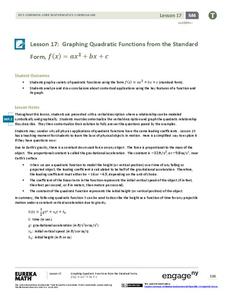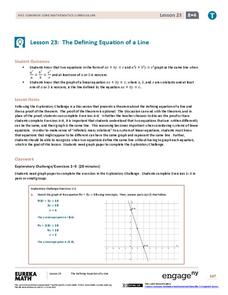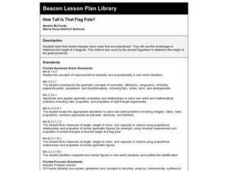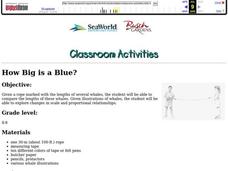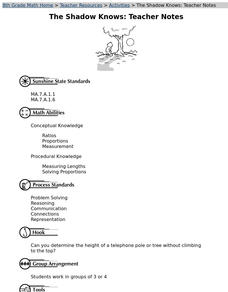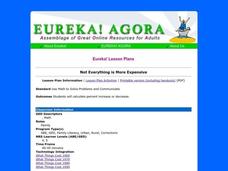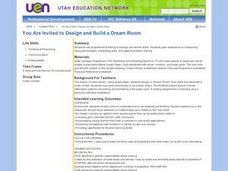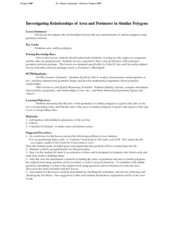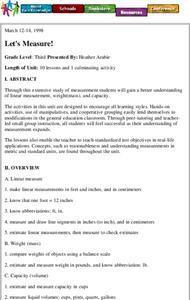Curated OER
The Disappearing Honeybees: Tracking Honeybee Decline
Students practice graphing and other math skills to track number of honeybee colonies present in United States since 1978, discuss major crops that are dependent on insect pollinators, and examine reasons for decline of United States...
Curated OER
How Big is a Blue?
Young scholars determine the length of different whales using a rope marked off and color coded to each length. They create life-size scale drawings of whales on butcher paper.
Inside Mathematics
Rhombuses
Just what does it take to show two rhombuses are similar? The assessment task asks pupils to develop an argument to show that given quadrilaterals are rhombuses. Class members also use their knowledge of similar triangles to show two...
Achieve
Yogurt Packaging
Food companies understand how to use math to their advantage. Learners explore the math related to the packaging and serving size of yogurt. They then use unit analysis and percent values to make decisions on the product development.
EngageNY
Graphing Quadratic Functions from the Standard Form
Use context to explain the importance of the key features of a graph. When context is introduced, the domain and range have meaning, which enhances understanding. Pupils use application questions to explore the key features of the graph...
EngageNY
The Defining Equation of a Line
They appear to be different, yet they are the same line. Part 24 out of 33 lessons provides a theorem about the relationships of coefficients of equivalent linear equations. Pupils use the theorem to determine whether two equations are...
Teach Engineering
Enough Energy? Play the Renew-a-Bead Game
Pairs simulate the energy usage of different countries by drawing beads from a bag, which contain different beginning ratios of non-renewable and renewable energy resources. The activity concludes with a series of questions to tie the...
Curated OER
Side Splitter Triangles
Learners investigate the side splitter theorem. For this geometry lesson, students estimate and solve problems dealing with ratios and proportions. They identify angles created by lines that are parallel.
Curated OER
Round The Track
Fourth graders develop problem solving skills while learning to measure an athletic track. The focus upon logic and reasoning is helpful for all types of science and math calculations.
Curated OER
How Tall Is That Flag Pole?
Students examine various triangles and discuss how similar triangles have sides that are proportional. They utilize an ancient Egyptian method to determine the height of a flagpole.
Curated OER
Similar Triangles
Ninth graders find the height of every day objects using techniques learned through postulates that allow triangles in a problem to be similar. They calculate the length of a missing side and solve proportions.
Curated OER
Balancing the Scales: Understanding Ratios
Students are introduced to the concept of ratios. In groups, they convert sets of numbers into a ratio. After practicing, they use the ratios and proportions to solve story problems. They also calculate map distances and discover map...
Curated OER
HOW BIG IS A BLUE?
Students compare the lengths of whales using different lengths of rope. They illustrate one whale in life-size proportion.
Curated OER
The Shadow Knows - Measuring Other Students
Eighth graders measure height and shadow length of other students on a sunny day and develop a ratio. They apply the ratio to other students and objects using shadows to determine height.
Curated OER
Not Everything Is More Expensive
Students investigate the concept of using different types of presentations to help solve mathematical problems. They research the use of illustrations to help understand data and its interpretation in a graphing format. Students also...
Curated OER
Hybrid Vehicles: Cut Pollution and Save Money
Students examine how driving a hybrid car can save money and cut down on pollution. In this hybrid vehicles instructional activity students complete an exercise that shows them how to work with proportions, percents, dimensional...
Curated OER
You Are Invited to Design and Build a Dream Room
Seventh graders watch a video and enlarge and shrink scale by applying proportional thinking. They practice measuring, using percentages, computing area, and problem solving.
Curated OER
A Never-Before-Seen Creature
Students construct a never-before-seen creature in part of an analysis of societal injustices and discrimination. In this societal issues lesson, students create a creature called a Man-Droid as a study about the differences among...
Curated OER
Ratios (Cost of a Habit)
Students consider an individual habit and its cost. They study ratios and proportions, and use that knowledge to calculate the cost of a habit over extended periods of time. write a detailed comparison of the costs.
Curated OER
Creating The Blueprints
High schoolers engage in a lesson in order to create blueprints to design an original floorplan. They use graphing paper and drawing tools to demonstrate knowledge of the lesson objectives. Students label and use the right kind of...
Curated OER
Investigating Area and Perimeter of Polygons.
Student sinvestigate the area and perimeter of polygons. They differentiate between similar and congruent polygons.. They identify the ratio and proportions of the sides and angles of polygons.
Curated OER
Climate change in Canada
Students investigate the impact of human activity on the environment. In this secondary math/science lesson, students analyze and interpret information from data and graphs as they investigate trends in climate change and the reasons...
Curated OER
Let's Measure
Third graders practice measuring different objects. They discover the concepts of ratio and proportion and practice converting numbers into the correct unit. They read stories as well to help them with the concepts.
Curated OER
Botany Basics
Students survey plants. In this plant identification instructional activity, students explore the difference in plants to aid identification. Students determine which plants may be used for medicinal reasons.






